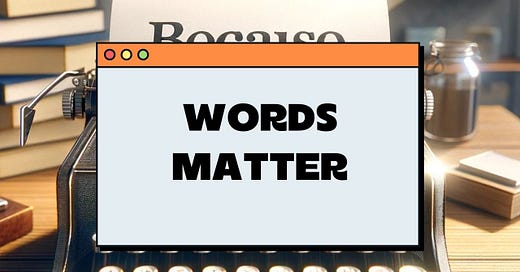🔤 3 Reasons Why Words Matter
Hello! Adam Thornhill here. ‘The Podcast Guy’ saving you 10 hours a week.
Enjoy the 125th Podup, with special thanks to ChatGPT Consulting.
Today, we’ll dive into the best insights and ideas from Nudge.
Today, words are plentiful. We can send long texts, record videos, and publish books with the push of a button. But it hasn’t always been so easy to communicate.
Before phone calls, we had to handwrite letters. Before YouTube, we had a handful of radio stations. With this shift, we’ve lost sight of the power single words can have.
The power of because
Harvard researchers asked New Yorkers at the library if they could cut in line to use the photocopy machine. Sometimes, they said ‘Hey, can I use the copy machine?’ and other times they said ‘Hey, can I use the copy machine because…?’
The researchers found a 50% increase in persuasion simply by adding that word because. It didn’t matter what the reason was, whether it was valid reason (because I’m in a rush) or if it was meaningless (because I need a copy).
Phill Agnew
Use could, not should
When we’re trying to solve a problem, come up with a new strategy, or make a decision, we often use a particular word – should. Researchers wondered whether changing the word from should to could would be more effective.
They asked some people to solve a variety of problems with the standard question of ‘What should you do?’. For others they changed should to could. Asking people what they could do helped people come up with better, more creative solutions.
The reason is simple. Should tends to narrow us a little bit. It makes you think that there’s only one right answer and you have to figure out what that is. Could encourages us to think more broadly and to think about a wider set of possibilities.
Dr Jonah Berger
Present tense wins
We’ve talked about shifting letters and words, now we’re going to shift the tense. I can either say ‘I loved that restaurant’ or ‘I love that restaurant’, and ‘They did a good job’ or ‘They do a good job’.
We looked at 500,000 online reviews and found that the subtle shift from past to present tense was more persuasive. People found the review to be more helpful and were more likely to buy a product.
Why is this? When you use the past tense, you say something was true. This is subjective because it was at a particular moment in time. It doesn’t suggest whether you will like it in the future.
When you use the present tense, you’re generalizing. You’re not just saying this one time it was true, but it’s more generally true. As a result, you seem more confident. People are more likely to listen to your advice and follow your suggestions.
Dr Jonah Berger
Why it matters
Choose your words wisely. The smallest tweaks can have an outsized impact on your ability to persuade, solve problems, and convey confidence. Understanding the psychology behind these word choices isn’t just an academic exercise – it’s a practical tool for enhancing communication with your team, your customers, and your prospects.
Next steps
Be mindful. Reflect on the language used in your daily communications. Are there opportunities to replace ‘should’ with ‘could’ to open up possibilities?
Be persuasive. Try adding ‘because’ to requests or explanations, especially internally. Your team will be more engaged when they have context.
Be present. Highlight reviews or testimonials that use the present tense and measure the impact this has on your conversion rates.
Keep learning. Stay informed about language research and psychological biases. One way of doing this is to subscribe to the Nudge podcast!
Establish feedback loops. Different words resonate with different people. Get feedback on your communication style and adjust based on what you learn.
Your thoughts?
Thanks to ChatGPT Consulting for making this post possible…
Struggling with ChatGPT adoption? Then you’re like most businesses:
✖ Employees are resistant to change
✖ Just 19% have tried ChatGPT
✖ Only 4% use ChatGPT daily
Avoid seeing your company being left behind - lead the way instead.
Transform your business productivity in 4 weeks. The accelerator program is designed to make ChatGPT an integral part of your business DNA.
The best part? It's not a one-size-fits-all approach. Get bespoke 1-on-1 ChatGPT training tailored to every person within your business.
P.S. This program has proven results, with 100% of staff reporting over 5.7% efficiency gains, and some staff boosting productivity by 21.3% 🚀💼
86% of readers have decision-making authority or influence. Reach C-Suite Execs, Directors/VPs, Senior Professionals, and Business Owners/Founders with Podup.
Quotes were pulled at different points of the episode. Sentences were left out to make the narrative more concise. Podup is not associated or affiliated with any podcast.






